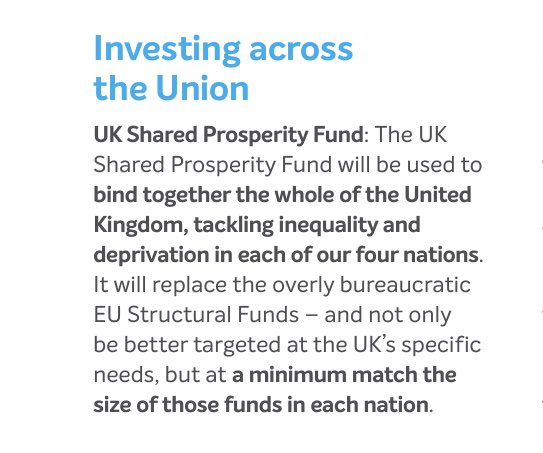“Brexiters for State Aid” is a good headline.
Of course many Brexiteers see the benefit of subsidy control and coordination. However fewer see the need for EU oversight in this area.
That’s why a meaningful UK State aid regime might be the way forward... econlib.org/brexiters-for-…
Of course many Brexiteers see the benefit of subsidy control and coordination. However fewer see the need for EU oversight in this area.
That’s why a meaningful UK State aid regime might be the way forward... econlib.org/brexiters-for-…
If the UK created a 🇬🇧 Subsidy Control regime without any consideration of an 🇪🇺trade deal, what would it look like?
The chances are that many fundamental characteristics would be present, eg transparency of awards, only paying against incurred expenditure and incentive effect.
The chances are that many fundamental characteristics would be present, eg transparency of awards, only paying against incurred expenditure and incentive effect.
There would be room for some quick wins, eg the undertaking in difficulty test could be redrafted so it’s clearer and simpler.
Would it go completely? Probably not, it’s useful to have a rule to avoid public funds going via zombie companies to creditors.
tinyurl.com/yxppdn8a
Would it go completely? Probably not, it’s useful to have a rule to avoid public funds going via zombie companies to creditors.
tinyurl.com/yxppdn8a
Likewise we could draw up new ways to award aid.
We could remove lower value subsidies completely from the system, so that the 650+ public bodies have a completely ‘free hand’ to decide how these are awarded.
We could remove lower value subsidies completely from the system, so that the 650+ public bodies have a completely ‘free hand’ to decide how these are awarded.
Under a UK State aid regime we could develop new block exemptions, eg 100% public funding for new innovation testing centres.
We could also have alternative ways for the largest subsidies from across the UK to be authorised.
We could also have alternative ways for the largest subsidies from across the UK to be authorised.
It’s exciting because there are ways through UK State aid law that we could make our economy work better, eg using data to establish which forms of public funding for innovation achieve the best results and which areas need the most support.
Furthermore the UK has some exceptional competition law experts, in private practice but also quietly working within the public sector.
It’s something that people often mentioned when I was on secondment in the European Commission working on State aid legislation.
It’s something that people often mentioned when I was on secondment in the European Commission working on State aid legislation.
Therefore I’m of the view that the UK is capable of building a new State aid regime, starting from WTO principles and taking account of what works well elsewhere.
If done correctly it could be a World leading regime, an example for others to follow.
If done correctly it could be a World leading regime, an example for others to follow.
Which brings us back to the 🇪🇺 question.
A ‘Rolls Royce’ UK State aid regime
would work for our economy and be almost impossible for Brussels to refuse.
After all, the Political Declaration requires a subsidy control regime with equivalent “high standards”...
A ‘Rolls Royce’ UK State aid regime
would work for our economy and be almost impossible for Brussels to refuse.
After all, the Political Declaration requires a subsidy control regime with equivalent “high standards”...
• • •
Missing some Tweet in this thread? You can try to
force a refresh























